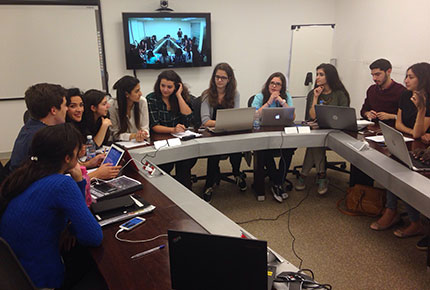LAU students present regional politics to the U.S.
LAU students present the political situation in the Middle East during the 12 edition of the Annual Michigan Student Political Issues Convention.
Early November, Lebanon and the U.S. grew a little closer. Through the words of a group of political science students at LAU, connected via video conferencing, American students and professors at the Henry Ford Community College were painted a clearer picture of Lebanon and the Middle Eastern region. This is the fourth year LAU students were given the opportunity to engage a foreign audience in their region’s political struggles.
Entitled Instability in the Light of Political Vacuum in Lebanon, LAU’s contribution was part of the Annual Michigan Student Political Issues Convention, an event of international caliber attended by congressional and public figures in the U.S. as well as over 700 students throughout Michigan. The topic of discussion touched a chord in this state, home to the highest concentration of Arab Americans (40%) and a significant Lebanese community.
Thanks to Political Science professor Imad Salamey, whose work laid the foundation of LAU’s participation in the conference, the students were able to shed light on the current political vacuum and its implications for the region.
Loulwa Jazairi, one of the panelists, made a point of stressing the magnitude of the Syrian refugee crisis in Lebanon. Providing concrete figures on how many refugees the U.S. would have to host in order to match the country’s intake, Jazairi astounded her audience with the extent of Lebanon’s efforts.
According to Ayyad El Masri, who curated LAU’s intervention in the conference for the second year, taking part in the event allows students to express their major political concerns and reflect on ways to resolve them.
“We presented what we deem is missing from the mainstream media narrative,” said El Masri, stressing the benefits of engaging in dialogue.
Referring to the aftermath of the garbage crisis that has left Lebanon paralyzed before the piling mounts of garbage, political science student Rayan Deeb blamed a dysfunctional political system for the risk of a “major health disaster.” Other students brought up the underreported issue of a growing cholera threat in the region.
During preparatory meetings, students debated possible solutions to the current instability. Finding a political way out for the Syrian war, and allowing refugees to move back safely to their country, was considered the most effective. In the concluding remarks, student Samuel Loro spoke about the alternatives that would help Lebanon overcome its political impasse. Among them, he outlined a possible transformation of the existing sectarian parliament into an upper chamber. “We treat the constitution as rigid when it was meant to be temporary,” he says. LAU students spoke unanimously against sectarianism and praised the current YouStink movement, prompting their American counterparts to express some hope that better times might in store for the Middle East.
More
Latest Stories
- Into the Psychology of Justice
- Alumnus Zak Kassas on Navigation, Spoofing and the Future of GPS
- Hearing Between the Lines
- LAU Hematology Conference 2025: Advancing Science Through Interdisciplinary Exchange
- Dr. Chaouki T. Abdallah Invested as LAU’s 10th President
- LAU Guides Its Students Through the Code of Conduct
- Innovative Procedure at LAU Medical Center–Rizk Hospital Signals Hope for a Patient With a Congenital Disease
- LAU’s Inaugural PodChat Session Addresses AI Detection in the Classroom


